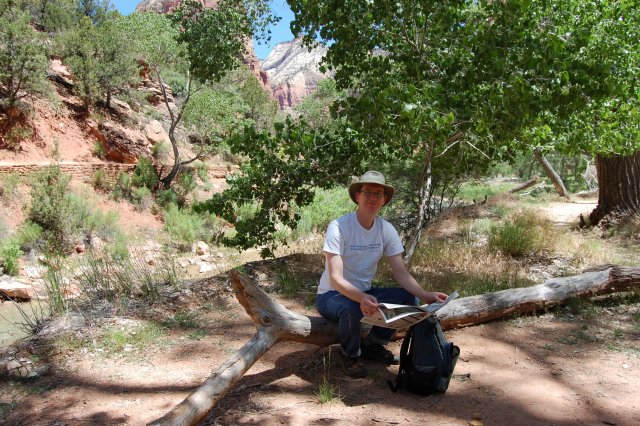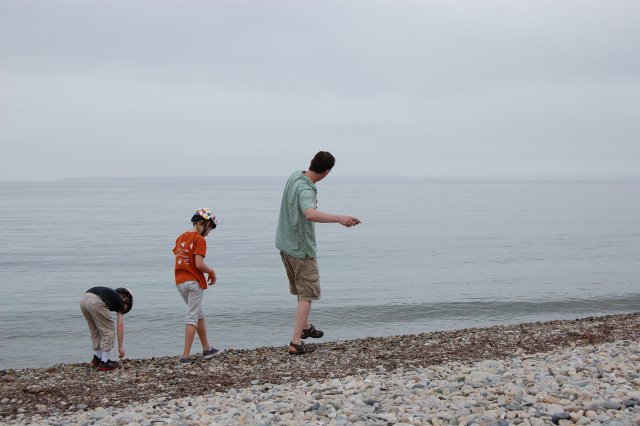Meet EPA Research Engineer Michael Tryby
Research engineer Michael Tryby develops and evaluates engineering processes for EPA tools that are used to protect public health and the environment. He currently works on our Stormwater Management Model, which is a widely-used tool that supports Green Infrastructure initiatives around the Nation and the world.

When did you first know you wanted to be a scientist?
Sometimes you meet people who always knew they wanted to be a scientist, but it wasn’t like that for me. I always had an interest and aptitude for science, but it was a long path of discovery to get to where I am in my career. When I was in high school my friend’s dad had a Ph.D. in economics, and he had his degree hanging in his home office. I saw it and I was like, “What is that?” I didn’t know that there was any other kind of doctor besides a medical doctor until the end of my senior year in high school.
How does your science matter?
Well, to put a fine point on it, I’m not actually a scientist—I’m a research engineer. So I’m trained as a civil environmental engineer, and I have a Ph.D. in civil engineering. I work on the Stormwater Management Model (SWMM) and that’s important because it’s basically the go-to tool that stormwater engineers use to design the stormwater and sanitary sewers in cities. They use it in the United States and around the world; I get support requests from all around world. It gets used every day by thousands of engineers, and it’s pretty important because it’s become an integral part of the stormwater management regulatory structure that the EPA has in place.
What do you like most about your research?
Well, when they let me, and when I’m not too busy doing other things, I really love programming. That’s a big part of what I do—software development. I like it because it’s like solving little puzzles all day long. It’s fun!
If you could have dinner with any scientist, past or present, who would it be? What would you ask him or her?
A long time ago I read Richard Feynman’s biography—the famous physicist—and he’s just a super cool guy. I mean, besides being super intelligent and winning the Nobel Prize, he was an amazing human being with a playful outlook on life.
If you weren’t an engineer, what would you be doing?
I actually started college thinking that I wanted to study architecture, so if I would have stuck with it I might have been an architect instead.
If you could have one superpower, what would it be and why?
I wish I could slow down time so that I could have more time to work and my kids wouldn’t grow up so fast.
Any advice for students considering a career in science or engineering?
Yeah, if you’re planning a career in science or engineering—think seriously about graduate school. I’ve encountered students who are anxious about the application process and excited when they get into grad school. I always tell them, “The thing about graduate school is that it’s a lot easier to get in than it is to get out.”

What do you think the coolest scientific discovery was and why?
The Millikan Oil Drop experiment has always struck me as one of the most elegant scientific experiments ever performed. Robert A. Millikan won the Nobel Prize for measuring the charge on an electron using crude experimental apparatus and an incredible amount of ingenuity.
What do you think is our biggest engineering challenge in the next 20/50/100 years?
Oh this one’s easy, that’s going to be adapting to climate change.
Whose work in your field are you most impressed by?
I was hired to replace Lew Rossman as he was nearing retirement. I worked with him for a couple of years before he left the agency. He had an impressive career at the EPA but his most notable accomplishments were the development of EPANET and redeveloping SWMM – the first and third most frequently downloaded research products in the entire agency. He’s been a mentor and a colleague to me and his dedication to public service and his job is just incredible. He’s actually still working for EPA in his retirement and helping out with the development of SWMM and EPANET. I’m most impressed by him.
You’re stranded on a desert island– what item do you bring?
It’s funny, during orientation week my freshman year of college this was one of the icebreaker questions. If you were stranded on a desert island what single item would you bring? Everybody was like “Oh I’d bring my radio because I love music” or “I’d bring a pillow because I like to sleep” and this one guy says “A purpose.” I thought that was the best answer, ever.
Editor's Note: The opinions expressed herein are those of the researcher alone. EPA does not endorse the opinions or positions expressed.
